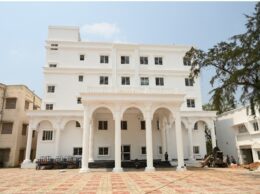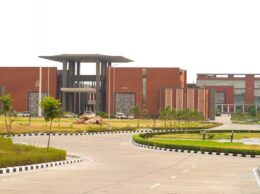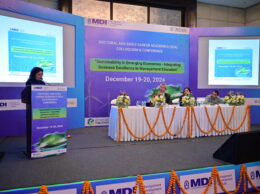Mandi, 10th July 2019: Having started its journey in 2009 with 510 acres of grassland on the banks of river Uhl in the village Kamand of Himachal Pradesh, 460 kms away from New Delhi, the Indian Institute of Technology Mandi has made impressive and rapid strides towards creating a remarkable and unique campus in the challenging yet serene Himalayan setup.
The Institute now has a state-of-the-art infrastructure with a built-up area of 1.15 lakh sq. mt comprising of housing for 1,300 students, 112 faculty and 61 staff members, cutting-edge laboratories, libraries, sports facilities, spaces for other extra and co-curricular activities. This includes a 750-seater auditorium which is one-of-its-kind in the region and has already started hosting events attracting experts from all over the world. The unique design of the hostels with large common spaces and terraces is an added perk for the students. The Institute is on track towards completing 2.16 lakh sq. mt of construction by the year 2021 to provide for 2,580 students and 270 faculty and staff members.
Highlighting the state-of-the-art infrastructure on campus, Prof. S. C. Jain, Dean (Infrastructure and Services), IIT Mandi said, “We are on our way towards creating one of the most beautiful campuses in the country. The rivers, mountains and the warmth of people, tempered with the best of residential, academic, and institutional infrastructure, has set IIT Mandi on its path towards emerging as a place of attraction for the best minds across the world.”
Technology – Enhanced Services
The Construction and Maintenance Wing of IIT Mandi uses a web-based project management tool developed in-house by students with an open source platform to monitor the progress of construction. It also uses an online Ticketing System to manage maintenance services.
The Institute has established an advanced IT infrastructure including high-speed links of 1 GBPS capacity based on an optical backbone and more than 200 Wi-Fi access points. The Institute has also established a High-Performance Computing Cluster with 160 nodes based on 3000 cores (CPU+GPU) and this continues to grow steadily.
Future plans include establishing the Eduroam services (a global service that enables students, researchers and staff from participating institutions to obtain internet connectivity across campus when visiting other participating institutions), Unified Threat Management infrastructure and to extend the backbone infrastructure to 10 GBPS besides developing a disaster recovery site.
IIT Mandi has established National Knowledge Network Facilities including Virtual classrooms of 100 plus capacity and Conference Halls in all academic blocks. The academic blocks have spacious classrooms with a capacity ranging from 30 to 300. The institute houses a Main library with a collection of 18,948 books and a fully automated and Radio-frequency Identification (RFID) enabled Satellite library with 20,000 online resources for students, faculty and staff. Future plans include creating a virtual classroom of 250 capacity and professional Recording Studio besides three conference rooms.
Highlighting the accommodation facilities for the faculty and visiting faculty, Dr. Kaustav Sarkar, Associate Dean (Infrastructure), and Assistant Professor, School of Engineering, IIT Mandi, said, “The campus offers residency to all faculty members and visitors. The apartments have been designed with plenty of bay windows and balconies, to maximize the natural comforts. The gardens, clubs and community halls cater to the requirements of social gatherings. The ongoing landscaping activities will further add to the beauty of the campus.”
The vision of scenic natural beauty which one could gather through the glass facades of the 3 dining halls at IIT Mandi is a great example of modern architecture. It also has a one of its kind fully functional guest house with 88 rooms for national and international visitors.
Important Upcoming Projects
Some of the important upcoming projects include a 1.6 km long-cycle track through botanical garden, and a 2-lane bridge, to facilitate efficient transportation in the scenic hilly terrains between the North and South campuses of the institute. Sports, co-curricular and extra-curricular activities are also of high importance for the Institute. In addition to the existing indoor badminton courts, table tennis hall, football and cricket fields and gymnasium, the Institute is creating a one of its kind pavilion, a hockey ground with kiosk, and also setting up new tennis, volleyball and basketball courts.
The Institute currently has a medical unit in the South campus and a Health Care Centre with 3 Medical officers, an ENT specialist and a Pediatrician, in the North campus. The facilities include a Procedure Room, a Minor Operation Theatre and Physiotherapy Centre.
The Institute has also set up within its campus important support services, such as crèches, a botanical garden with a rich diversity of local plants, children’s parks, stationery shops, a campus school, banks and ATMs, for the convenience of campus residents.
Green Activities
Efficient waste-management practices are held in high priority for the campus. The waste generated at each source is segregated through the active participation of residents. A Biogas Generator of 150 kg feed capacity has been installed for the digestion of biodegradable wastes. Sewage Treatment Plants have been set up to ensure that all waste-water generated in the campus gets suitably treated before discharge and reuse. Special efforts have also been put towards the identification of local flora and fauna, and in ensuring that the campus growth continues to be in harmony with them. Future plans include reuse of treated waste-water, development of plant nursery, better segregation and in-house composting.









